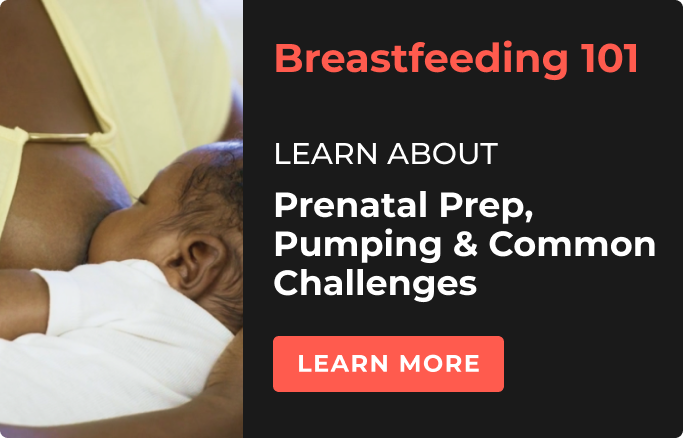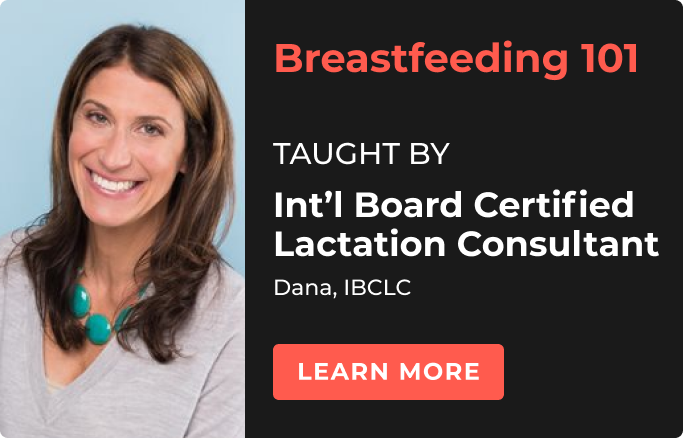By Liz Moorhead
I’m breastfeeding. Is it safe for me to get the COVID-19 vaccine?
While there is no definitive answer just yet, the consensus is that yes, it most likely is safe for a breastfeeding parent to get the COVID-19 vaccine. No one can say with 100% certainty because breastfeeding parents and nursing infants were not included in the first round of clinical trials. We can, however, use what we know about vaccines in general, the two approved mRNA coronavirus vaccines, and the recommendations of your specific provider to make educated assumptions.
Though we haven’t studied the effects of the COVID-19 vaccine on breastfeeding, we know how vaccines like this work. We also know that other vaccines are generally safe for pregnant and lactating parents, and many are recommended. And we know that the side effects of the vaccine (arm pain, headache, fever) can be addressed with acetaminophen and motrin, both of which are safe to take while nursing.
On top of that, all major medical organizations including the CDC, the Academy of Breastfeeding Medicine, the American College of Obstetricians and Gynecologists, and the Society for Maternal-Fetal Medicine believe it’s most likely safe to get the vaccine while breastfeeding. The ABM also states there’s no reason to stop breastfeeding if you do get vaccinated.
In short, it is most likely safe to get the COVID-19 vaccine while breastfeeding. It’s important to remember that our understanding of COVID-19 is evolving rapidly and new vaccines are getting closer to approval, so it’s a good idea to check the latest guidance. And every medical situation is unique, so be sure to speak with your healthcare provider about your personal circumstances and weigh the risks, benefits, and preferences that are unique to you.
Do COVID-19 vaccines contain live virus?
There is no live virus in the Moderna and Pfizer FDA-approved COVID-19 vaccines. This means there’s no way for you to become infected with COVID-19 by them, or to pass COVID-19 to your baby by receiving them. Moderna and Pfizer are mRNA vaccines. An mRNA is a “messenger RNA vaccine,” a vaccine that delivers the instructions for making just a small piece of a viral protein. They don’t carry any infectious elements and they don’t recreate the whole protein—just enough to trigger your body’s immune system and begin creating antibodies. Not only do they not infect you, but they also don’t enter the nucleus of the cell, so they can’t affect someone’s genetic makeup.
The FDA has newly approved the single-dose Johnson & Johnson vaccine. If you are pregnant or breastfeeding, talk to your healthcare provider about which vaccine option is right for you and your family. This article will be updated as more information on this vaccine is released.
If a breastfeeding parent gets the vaccine, can it also provide protection to their breastfed infant?
Most likely, yes! Vaccination causes your body to develop antibodies to protect against infection. We know antibodies pass through breast milk to nursing babies, so we can assume the same will be true for COVID-19 antibodies. A vaccine can protect both the parent and the baby!
While there are still questions about how the vaccine affects breastfeeding people and nursing infants, there’s a lot we do know! We know that vaccines like this do not contain anything infectious, that babies benefit from a parent’s antibodies, and that trusted medical organizations encourage vaccination.
Even without the worries of a pandemic, breastfeeding can be stressful. You can find more reassuring information and advice in our course, Breastfeeding 101: From Prenatal Prep to Pumping.
About the Author
Liz Moorhead is a writer whose work has been featured in Jezebel, Refinery29, and the Washington Post. She lives just outside of Philly with her husband, two kittens, and four mud-covered sons.




